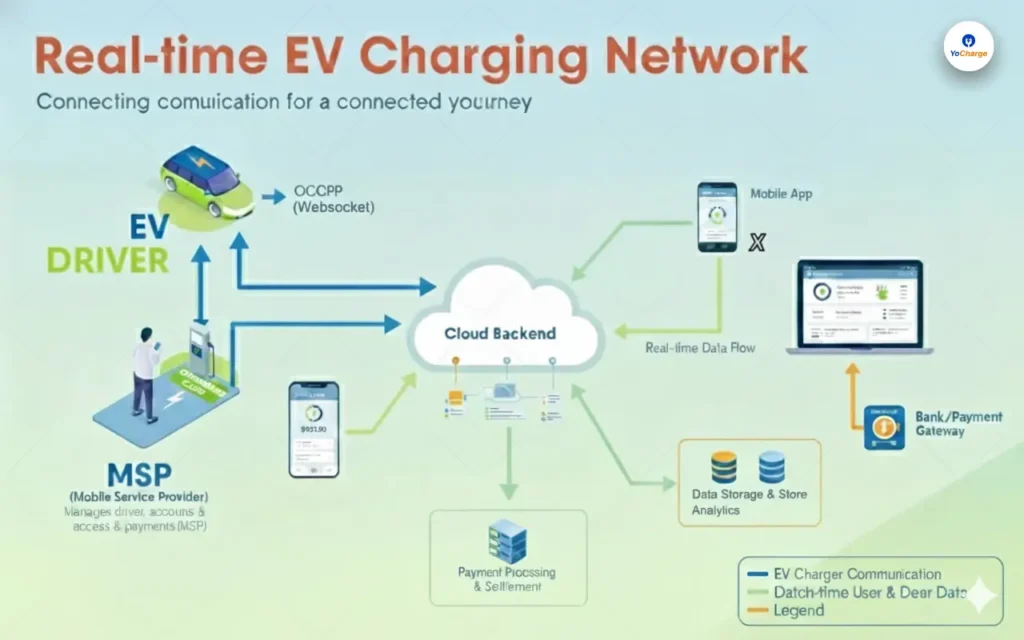
Do you want to optimize your EV charging operations with the EV Fleet Management Platform ? Then choosing the best platform is a crucial step. The adoption of electric vehicles (EVs) in fleet operations is rapidly accelerating. In 2023, plug-in vehicle sales increased by over 50% from 2022, with more than 1.4 million plug-in electric vehicles (PEVs) sol.(ref). As the number of EVs in fleets continues to grow, fleet managers face significant challenges in managing charging logistics and rising energy costs.
One of the primary concerns for fleet managers is ensuring that vehicles are adequately charged and ready for operation, improving fleet reliability and operational efficiency.
Additionally, the need to balance charging times with off-peak electricity hours to reduce energy costs and avoid grid overload is a pressing issue. To address these challenges, EV fleet management platforms have emerged as a comprehensive solution.
An EV fleet management platform offers a range of features, including charger management, vehicle management, energy management, payment management, and reporting & analytics. By using smart charging technology and real-time data analytics, these platforms optimize charging schedules, reduce energy costs, and enhance efficiency.
Understanding EV Fleet management platform
EV fleet management platform optimizes charging infrastructure through real-time monitoring, automated scheduling, load balancing, and remote access. It tracks charger status, energy consumption, and availability. It schedules charging sessions based on energy costs, vehicle needs, and grid availability. EV fleet management platform distributes charging load across multiple chargers to prevent overloading and optimize energy usage. It allows remote management of charging via a web or mobile app.
For vehicle management, the EV fleet management platform offers tools for vehicle tracking, route optimization, maintenance scheduling, and more. Such platforms monitor vehicle location, status, and battery level in real-time. Fleet management platform plan routes considering charging needs and battery range. It schedules preventive maintenance based on mileage or other factors.
Data analytics and reporting tools in these platforms help companies track energy consumption, identify cost savings, and improve fleet efficiency. EV fleet management platforms monitor energy usage for individual vehicles, chargers, and the entire fleet. They analyze data to identify opportunities to reduce energy costs and optimize charging strategies. They provide insights into vehicle utilization, driver behaviour, and charging infrastructure performance.
Key features of an EV Fleet Management Platform
EV Fleet Charging Management Platforms offer several key features to optimize charging operations and reduce costs for fleet managers. These platforms provide comprehensive solutions for charger management, vehicle management, energy management, payment management, and reporting & analytics.
Charger Management
EV Fleet Charging Management Platforms enable fleet managers to track the status of individual charging stations in real-time, whether they are available, in use, or offline. This visibility allows for efficient utilization of charging infrastructure and proactive maintenance scheduling.
Additionally, these platforms offer remote control capabilities, allowing fleet managers to start or stop charging sessions and adjust power output as needed.
Vehicle Management
These platforms provide fleet managers with the ability to track the location and charging status of individual fleet vehicles. By monitoring vehicle battery health and optimizing charging cycles, the platforms help extend battery longevity and ensure vehicles are ready for operation when needed.
Integration with existing telematics systems offers a holistic view of fleet operations, enabling informed decision-making.
Energy Management
EV Fleet Charging Management Platforms track real-time energy consumption for individual vehicles and charging stations. By utilizing smart charging features, these platforms optimize power usage and minimize costs by scheduling charging during off-peak hours or when energy prices are lower.
Integration with utility companies allows for dynamic pricing and demand response programs, further reducing energy costs.
Payment Management
These platforms offer flexible billing options for drivers and businesses, including subscriptions and pay-per-use models. By integrating with existing fleet management systems, payment management features streamline accounting processes and ensure accurate cost allocation. Secure payment processing and data encryption safeguard sensitive financial information.
Reporting & Analytics
EV Fleet Charging Management Platforms generate comprehensive reports on charging usage, energy consumption, and costs. These insights enable fleet managers to analyze charging behaviour, identify optimization opportunities, and make data-driven decisions.
Custom reports and dashboards provide a clear overview of fleet performance and support strategic planning.
Additional considerations for choosing an EV fleet management platform
When selecting an EV Fleet Charging Management Platform, there are several crucial factors beyond the core features that fleet operators should consider. Some major features are given below:
Security & Data Protection
- Secure Access Control: It is essential to ensure that the platform provides secure access control mechanisms to prevent unauthorized access to sensitive charging data.
- Data Encryption: Encryption of charging data is vital to protect the privacy and integrity of the information stored within the platform.
- Compliance: The platform should comply with relevant data privacy regulations such as GDPR and CCPA to safeguard user data and ensure legal compliance.
Scalability & Future-Proofing
- Future Fleet Growth: Choose a platform that can scale with your fleet’s growth and accommodate the increasing adoption of EVs over time.
- Integration Capabilities: Consider the platform’s ability to integrate with future EV technologies, such as vehicle-to-grid systems, to stay ahead of technological advancements and industry trends.
Customer Support & Service
- Reliable Support: Opt for a platform that offers reliable customer support for technical assistance and user training to ensure smooth operations and quick issue resolution.
Integration with Existing Systems
- Seamless Integration: Ensure that the platform integrates seamlessly with your existing fleet management software and telematics systems to avoid compatibility issues and streamline operations.
These additional considerations play a significant role in the successful implementation and operation of EV fleet management platforms, enhancing security, scalability, customer support, and integration capabilities for fleet operators.
Pro-tips for successful EV fleet management platform implementation
Implementing an Electric Vehicle (EV) Fleet Management Platform requires careful planning and execution for seamless integration and optimal performance. Here are essential pro-tips for successful implementation:
| Define Clear Goals and Objectives | Set Specific Targets: Define goals for EV charging operations, such as reducing energy costs, increasing fleet efficiency, or enhancing sustainability. |
| Involve Key Stakeholders | Fleet Managers: Engage them to ensure operational needs are met and the platform aligns with their goals. |
| Drivers: Involve them to ensure understanding of new charging protocols and platform usage, reducing disruptions and improving adoption. | |
| Finance Departments: Include them to ensure the platform aligns with budget constraints and maximizes cost savings. | |
| Provide Comprehensive Training | Charging Protocols: Offer training for drivers on charging protocols and platform usage to ensure a smooth transition and minimize downtime. |
| Platform Usage: Provide detailed training on the platform’s features and functionality to ensure effective use. | |
| Continuous Monitoring and Analysis | Data Insights: Monitor and analyze charging data to identify improvement areas, such as optimizing schedules or reducing energy consumption. |
| Platform Insights: Use insights to optimize charging strategies and maximize cost savings, ensuring full potential use of the platform. | |
| Leveraging Platform Insights | Optimize Charging Strategies: Use insights to charge vehicles efficiently and effectively. |
| Maximize Cost Savings: Schedule charging during off-peak hours, reduce energy consumption, and optimize energy usage to maximize cost savings. |
The Final Words
Choosing the best EV Fleet Management Platform is crucial for optimizing charging operations and reducing costs. To ensure a successful implementation, fleet operators should consider several key points. These include charger management, which involves tracking charger status, monitoring health, and remotely controlling charging sessions. Vehicle management is essential for tracking vehicle location, charging status, and battery health.
Energy management focuses on optimizing energy consumption through smart charging and dynamic pricing. Payment management should offer flexible billing options and integrate with existing accounting systems. Reporting and analytics capabilities are necessary for generating reports on charging usage, energy consumption, and costs.
Security and data protection are vital to ensure secure access control and data encryption. Scalability and future-proofing are important to accommodate future fleet growth and EV adoption. Customer support and service should provide reliable technical assistance and user training.
If you are looking to optimize your EV charging operations you can contact with YoCharge for a consultation. We are a leading EV fleet management platform that can help you to assess your specific needs and give the best fleet management services.



